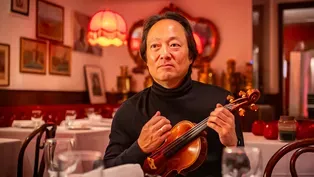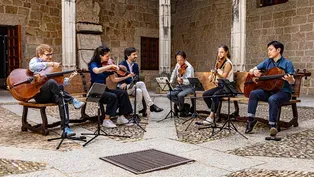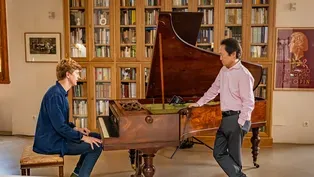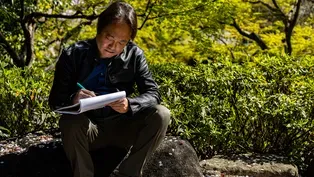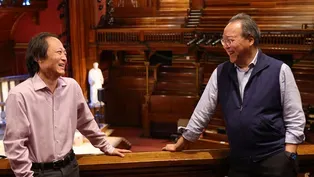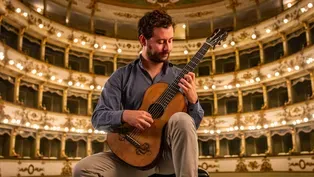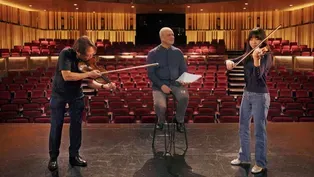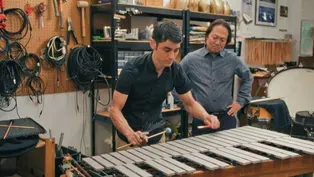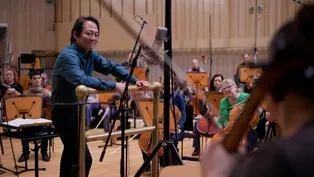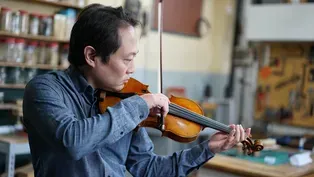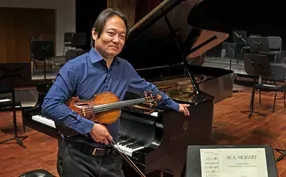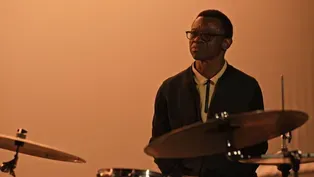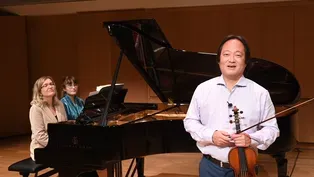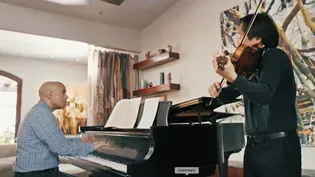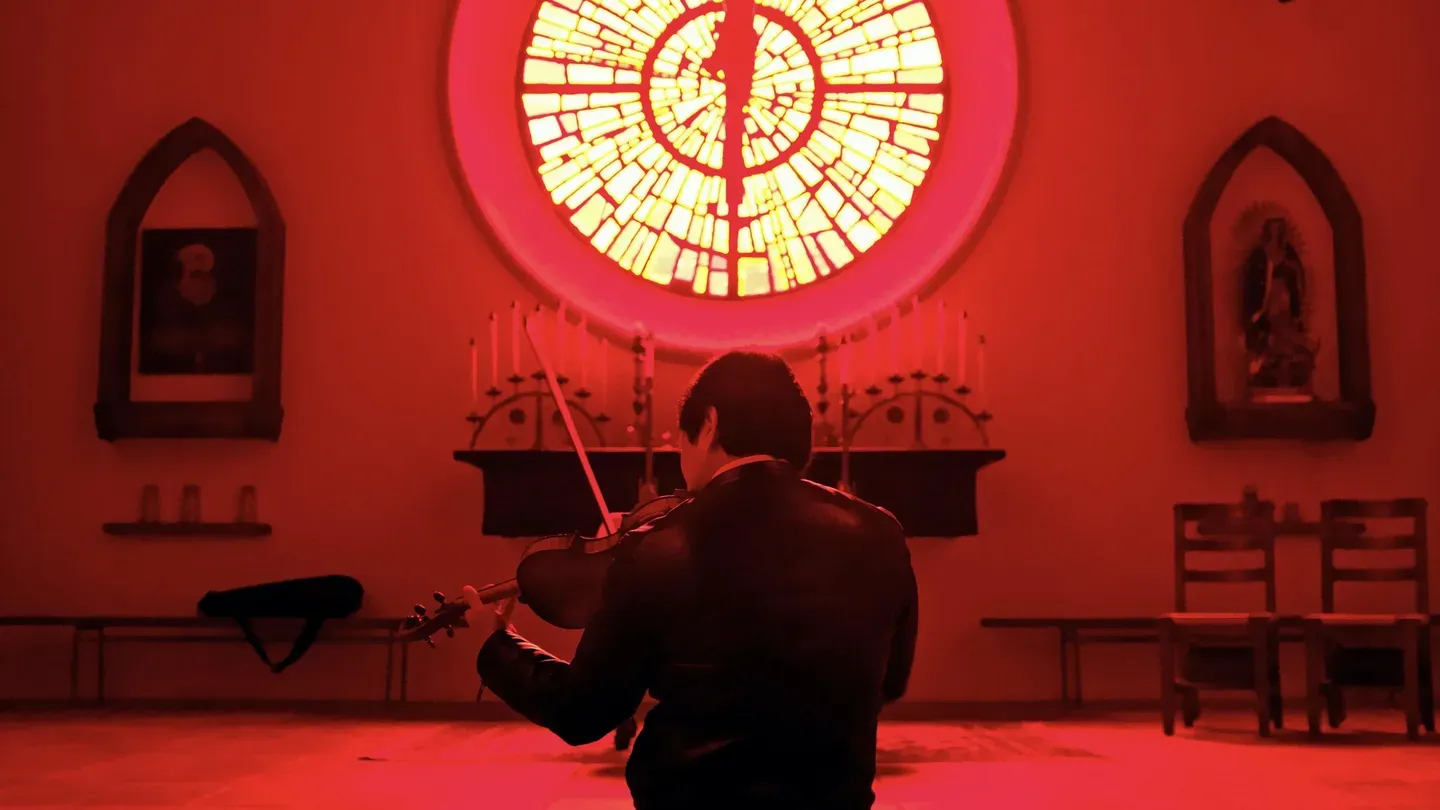

Now Hear This “Becoming Mozart”
Season 48 Episode 4 | 54m 5sVideo has Closed Captions
Travel with host Scott Yoo and Stewart Goodyear as they visit Yoo’s Festival Mozaic.
Travel with host Scott Yoo and pianist Stewart Goodyear as they visit Yoo’s Festival Mozaic where Goodyear learns to direct an orchestra from the piano while improvising the solos of Mozart’s twentieth piano concerto.
Problems with Closed Captions? Closed Captioning Feedback
Problems with Closed Captions? Closed Captioning Feedback
Major series funding for GREAT PERFORMANCES is provided by The Joseph & Robert Cornell Memorial Foundation, the Anna-Maria and Stephen Kellen Arts Fund, the LuEsther T. Mertz Charitable Trust, Sue...

Now Hear This “Becoming Mozart”
Season 48 Episode 4 | 54m 5sVideo has Closed Captions
Travel with host Scott Yoo and pianist Stewart Goodyear as they visit Yoo’s Festival Mozaic where Goodyear learns to direct an orchestra from the piano while improvising the solos of Mozart’s twentieth piano concerto.
Problems with Closed Captions? Closed Captioning Feedback
How to Watch Great Performances
Great Performances is available to stream on pbs.org and the free PBS App, available on iPhone, Apple TV, Android TV, Android smartphones, Amazon Fire TV, Amazon Fire Tablet, Roku, Samsung Smart TV, and Vizio.
Buy Now
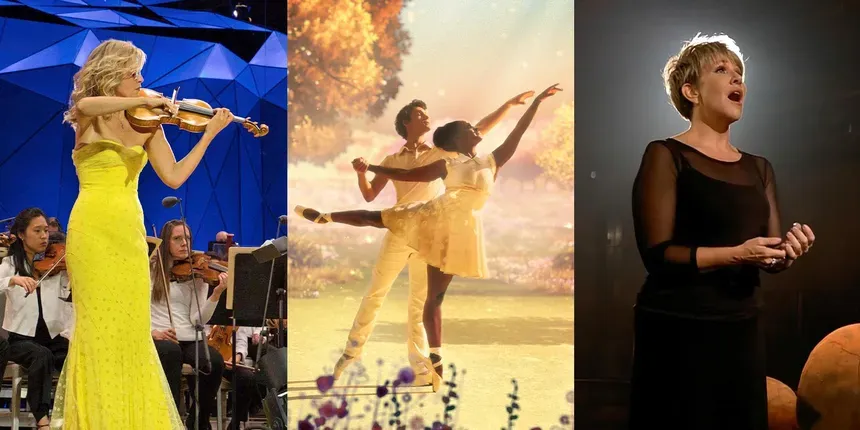
Great Performances Newsletter
Subscribe to the Great Performances newsletter to keep up with the latest full episodes to stream, exclusive content, and more!Providing Support for PBS.org
Learn Moreabout PBS online sponsorshipMore from This Collection
Now Hear This "Barrios: Chopin of the Guitar"
Video has Closed Captions
Discover Agustin Barrios’ rise from rural Paraguay to becoming a pioneering guitar composer. (54m 24s)
Now Hear This "Rachmaninoff Reborn"
Video has Closed Captions
Discover Rachmaninoff's reinvention as an American artist after losing everything in Russia. (54m 23s)
Now Hear This "Boccherini: Night Music"
Video has Closed Captions
Explore Boccherini’s love for Madrid through a musical night tour of the city with Scott Yoo. (53m 54s)
Now Hear This “Chopin’s Polish Heart”
Video has Closed Captions
Explore Chopin’s musical evolution from Poland to Paris with Scott Yoo and pianist Jan Lisiecki. (53m 54s)
Now Hear This “The Composer is Yoo”
Video has Closed Captions
Follow host Scott Yoo’s journey to compose a piece of music for the first time. (54m 24s)
Video has Closed Captions
Explore how virtuosos become maestros, featuring Yo-Yo Ma, Lynn Chang and more. (53m 54s)
Video has Closed Captions
Explore the work of two legendary virtuosos, Niccolò Paganini and Robert Johnson. (53m 24s)
Video has Closed Captions
Visit Julliard Pre-College with Scott Yoo to play with some of tomorrow’s virtuosos. (53m 54s)
Now Hear This “Albéniz: Portraits of Spain”
Video has Closed Captions
Discover the inspirations Spain provided composer Isaac Albéniz with host Scott Yoo. (54m 25s)
Now Hear This “Andy Akiho Found (his) Sound”
Video has Closed Captions
Experience the creation of music from this Japanese American composer with host Scott Yoo. (53m 34s)
Now Hear This “Schumann: Genius and Madness”
Video has Closed Captions
Visit Scotland, Germany and France with host Scott Yoo. (53m 25s)
Now Hear This “Piazzolla’s History with Tango”
Video has Closed Captions
Tango to Buenos Aires, Argentina, with host Scott Yoo. (53m 55s)
Providing Support for PBS.org
Learn Moreabout PBS online sponsorship♪♪ -I'm Scott Yoo.
Next on "Great Performances," the great Canadian pianist Stewart Goodyear will join me to try to do what no living pianist has done.
♪♪ These are masterpieces.
-One after the other.
-He'll play one of Mozart's most famous piano concertos... You know the piano part.
How well do you know the orchestra part?
...while conducting it... and improvising the solos... Each one of those today is a full-time job.
...lust like Mozart would have done.
This is not relaxed.
This is.
This is not bone and skin.
It's spaghetti.
Late!
They need a conductor to sit there and go, "Boom!"
As he trains and rehearses for this incredible feat... One of your jobs is to become inspired.
-Every artist has their own point of view.
-...we'll both gain a deeper appreciation for Mozart's genius.
♪♪ When you're playing great music, it makes you try to be more than you are.
♪♪ Coming up on "Now Hear This: Becoming Mozart."
[ "The Marriage of Figaro" overture plays ] ♪♪ ♪♪ -If you've seen this show before, you may know me as a violinist.
But for more than 20 years, my main job has been conducting.
♪♪ ♪♪ ♪♪ During the season, I conduct the Mexico City Philharmonic.
But every summer I come here, to Festival Mozaic.
♪♪ ♪♪ ♪♪ We now play works from all composers, but the festival began 50 years ago to focus on the works of Mozart, like this overture from "The Marriage of Figaro," one of his 22 operas, among 41 symphonies and 500 other works.
♪♪ Good.
Let's rehearse.
Can you make more fortepiano?
[ Vocalizing ] Okay.
Let's just hear David and -- and Liz.
[ French horns playing single note ] Kate.
[ French horn joins ] Thank you.
Great.
Let's keep it there.
By the way, I hear -- [ Vocalizing ] There's too many ornaments on the tree.
Let's go from 236, please.
♪♪ ♪♪ Mozart was inventive and successful in all formats.
♪♪ But there was one where he set the standard for all who followed -- the piano concerto.
And whenever he premiered one, the piano soloist was Mozart himself.
♪♪ [ Finale plays ] Great.
Tomorrow, Stewart Goodyear will be coming here to play Mozart's 20th piano concerto, and he's going to try to do what Mozart did.
He's going to play the concerto, he's going to conduct the concerto from the piano -- and he's never conducted before -- and he's going to improvise the cadenzas.
Think about how hard that is.
It's really, really difficult.
Anyway, be patient with him.
He's really a huge talent.
Okay?
See you tomorrow.
♪♪ ♪♪ Festival Mozaic happens each year in San Luis Obispo, on the central coast of California, a place famous for vineyards and ocean views.
But what's less known are its miles and miles of rolling hills which, after the rains, feel more like Ireland.
On a nearby ranch, a festival board member lent us a place to rehearse.
♪♪ ♪♪ ♪♪ ♪♪ Stewart's been performing Mozart piano concertos since he was 12 years old, but never like he'd try to do it here.
I'd have to teach him enough about conducting in just one week to successfully lead the orchestra.
♪♪ Oh, man.
-22.
-That's how old he was?
-22 years old, yeah.
-Yeah.
That's incredible.
-Unbelievable.
-So, we're here to talk about conducting.
-Yes, we are.
-Rule one -- you've got to know the score.
I mean, not just your part, but -- -Every part.
-What you're buying is credibility, okay?
So, if they know that you know what they have and you're kind of guiding them in like air-traffic control, "I got you, I got you"... -They'll be able to trust me.
-...they trust you, and then they'll go with you.
"Oh, you want that?
I'm going to go with you."
-Yeah.
-And then it becomes a much more unified experience on stage.
Now, obviously you know the piano part.
-Yeah.
-Okay.
How well do you know the orchestra part?
-I feel like I'm skimming the surface every time I study it.
-So we've got to work on that, 'cause that's the most paramount, important thing... -Yeah.
-...I would say.
Um, this is how I learn.
I just play it.
-Okay.
-Can you play the first violin part -- the viola part, second-violin part, and first-violin part with your right hand?
And close the music so you can't read it?
-Right.
Yeah.
[ Piano playing ] ♪♪ -That's good.
Okay.
I'll play the first-violin part, second-violin part, and viola.
I'll sing the viola line.
And can you play the cello part and the bass part with your left hand, and then, when the horns have to come in, I want you to sing that D. [ Vocalizing ] -Okay.
-Okay?
Let's try it.
-All right.
-[ Vocalizing ] ♪♪ -Late!
It's late.
The horns come in there.
You've got to sing that.
-The horns come in late?
-Look at the score.
They come in on the downbeat.
You didn't sing it.
-Right!
-Yes.
Okay.
And that's super-important because the horns, they really need your help.
You know why you're conducting, right?
It's because people can't hear each other.
If you're sitting back there where the horns are, you can't hear anything.
[Muffled] It sounds like this.
-Yes.
-[Normal voice] And it's impossible.
So they need a conductor to sit there and go, "Boom," so that they know when to play.
Otherwise, it's just terrifying for them.
-Right.
-So that's super-important.
Okay.
You're never going to make that mistake again, okay?
That's page one.
I don't know.
There are like 70 pages in the score?
You got to go through page 2 like that, page 3 like that, 4.
You've got to do this before you step on the podium.
-Okay.
-Okay?
♪♪ [ Birds chirping ] ♪♪ Stewart is known for his interpretations of Mozart and Beethoven as a pianist, but interpreting a work for an orchestra is a much larger challenge.
I took him for a hike above the house to give him some pointers.
♪♪ ♪♪ ♪♪ So, one of your jobs while you're here in California is to, you know, walk around and become inspired and imbibe a piece like Mozart's 20th and figure out what you want.
-First time I heard this concerto, I was 4 years old, and it scared me.
-Really?
-I had this notion in my head that I was hearing a musical depiction of a storm coming through, and you felt the thunder before you heard it.
And then suddenly there was this crack that just alerted you.
-I mean, who knows what inspired Mozart to write this piece, you know?
-Yeah.
-But I think, since you're going to be conducting this piece, it's not so important what inspired Mozart, but what inspires you.
I still remember my first conducting lesson.
It was 26, 27 years ago.
And my teacher said to me, "The most important thing when you conduct..." -- And I was sort of waiting for it and thinking, "Oh, it's, you know, your right hand has to do this," or, "Your left hand has to do this."
And he said, "The most important thing is to have a really strong point of view."
And your job as a conductor is to get other people to do it your way, to play your idea.
And that's what I hear from orchestra musicians.
The single biggest complaint of any conductor is, "We didn't know what they wanted."
And that's what you have to -- -Convey.
-You have got to convey that.
Absolutely.
-Yeah.
-It's got to be specific.
Hone your interpretation and make it more vivid, more poignant, more delicate, whatever.
-Yeah.
-But maybe you'll find something new, you know, that extra 10% you need to make a really memorable performance.
-Right.
-That's what we're all search-- -That's what we're all striving for.
-That's what we're all searching for.
[ Instruments warming up ] ♪♪ ♪♪ Stewart, two really quick things before we go on stage.
This festival orchestra is unlike anything you've ever played with.
I know you've played with some of the greats, but this one is like the all-star team.
Each person has been hand-picked, and it's all the best people from all the best orchestras.
And if they smell even an ounce of fear from you, or hesitation, they'll just...tune you out.
-Then it's over.
-It's over.
You're a novice conductor, but you are an absolutely experienced pianist.
And you have to go in with that confidence.
The other thing is, since you've never conducted, I think it might be better for you to start in the middle, right when you come in.
Let them hear you play the piano and say, "Wow.
This Stewart is wonderful.
I love the way he plays.
You know, and his conducting's not so bad."
Rather than beginner conductor who also plays the piano.
-Right.
-And that is a razor's edge.
And you want to be on this side of that edge.
-Yes.
-Okay.
Let's go.
-Right.
[ Thumping ] Good morning.
Such a pleasure working with all of you.
We're going to be starting the Mozart, bar 77 where the piano solo comes in.
♪♪ ♪♪ ♪♪ [ Orchestra joins ] ♪♪ ♪♪ ♪♪ ♪♪ ♪♪ ♪♪ ♪♪ ♪♪ -When the soloist also conducts the orchestra, as Mozart did, they have to concentrate on delivering a masterful performance while listening to and leading the other musicians.
It's phenomenally difficult.
♪♪ ♪♪ ♪♪ ♪♪ Great, Stewart!
Terrific!
Let's stop there.
You didn't really give them a good cue, so they were late and slow.
Remember.
They can't hear you.
-Okay.
-Okay?
They have to be given something very clear and affirmative.
-Okay.
-Okay?
-[ Page turns ] -And even places like here, your left hand is not playing the piano here.
Your right hand is not playing the piano here.
Think about if Mozart were playing this concerto.
He is conducting with his left hand while his right hand is playing and vice versa.
Use all of the weapons in your disposal, meaning your two hands, to either be playing the piano or the orchestra.
-Yes.
Got it.
-Okay?
-Yeah.
So as I'm playing on the piano, is it, like, a quarter-note -- a head tilt beforehand?
-Head tilt.
You can stick out your tongue.
-[ Chuckles ] Okay.
-You know, wiggle your ears.
But you got to do something definite.
-Right.
Okay.
-Okay.
Let's do it.
-Right where we left off.
♪♪ ♪♪ ♪♪ ♪♪ ♪♪ ♪♪ ♪♪ ♪♪ -In his concertos, Mozart always improvised the cadenzas, the piano solos, then wrote them down later for others to play.
But he didn't for the 20th.
So other composers, like Beethoven, wrote their own.
♪♪ ♪♪ Sue Cahill, from the orchestra, is also a world-class jazz bassist.
I asked her to give Stewart some new ideas about harmony for his improvisation.
♪♪ -Beautiful.
-I'm trying to find my own point of view for this performance coming up.
I've improvised before, but... just how Beethoven had his own voice and his trademark genius, I have absolutely no idea whether or not I have genius or trademark, but I'm going to do my best and try to find my own way around it.
-Yeah.
What if we do some, um, improvisatory work in the second movement, where there isn't a cadenza?
-Perfect.
-I think what I'm going to ask you to do is only play the right hand.
-Okay.
-I think let's really bring it down to something smoky and dark.
Um... [ Vocalizing ] About there.
Two, ready, play.
♪♪ ♪♪ ♪♪ Yeah!
I like that.
That's cool.
-I was responding exactly to your harmonies, and you led me to where I should go.
-Yeah, I mean, that's the best thing about improvisation, is, like...
It's such a great way to communicate with your fellow musicians on stage.
-Exactly.
-Do you want to try maybe adding some chords underneath this, in this second movement?
-Sure.
-I think -- We would have to agree on the chords, so if you don't mind, want to just show you a quick thing here.
I think it'd be cool to add this into what we were doing.
So, this is just basically an outline of kind of the notes I was playing underneath what you were doing.
-Okay.
-So instead of the B flat, which is the, you know... [ Piano plays ] ...the opening of the second movement, we're going to switch it to D flat.
Okay?
I've added this kind of weird tone there, which, you know, you can do.
If it sounds good, go for it.
-Okay.
-And then the next couple of beats, I... [ Piano plays ] ...I added G flat.
Okay?
-Uh-huh.
-And then I went to E. And then you can see I've added a couple of more chords there.
Do you want to try that and see if that works for us to do together?
-Sure.
Absolutely.
-Yeah.
Okay.
-So, am I doing chords with you or just the melody?
-Do the melody, and then maybe you can just do the bass line here if you want.
Um, give it a shot.
♪♪ -Oh, wow.
Okay.
-[ Laughs ] ♪♪ ♪♪ -Something like that?
-Something like that.
You know, a good rule of thumb for just starting an improv in jazz is if you find yourself on the wrong note, like it sounds wrong to you, just move one note over.
-Oh, okay.
-Yeah, one tiny note.
Like, a little bit, not a lot.
-All right.
-And then you'll usually find your way.
-All right.
-Want to try it?
-Sure.
-Okay.
♪♪ ♪♪ ♪♪ -Putting different chords -- a different harmony -- under the exact same melody yields such different results.
♪♪ ♪♪ Stewart and I went back to the ranch house so I could teach him to communicate through movement.
♪♪ ♪♪ ♪♪ It's good.
It's good.
Stewart, just watch out.
Your hands are going like this.
I wanted to tell you this at the rehearsal.
Your hands are going like this, and so you're drawing all of my attention to your fingers.
-Oh, okay.
-Yeah.
And, um...
When you're conducting, it's kind of a strange thing to be moving your arms and essentially commanding people instantaneously with your hands.
I mean, when does that happen?
So in order to make this kind of unnatural act as natural as possible, you want to keep all the parts of your body as natural as possible.
So, first step, let's relax our hand.
This is not relaxed.
This is.
Just shake it out.
Just give me the last two bars.
♪♪ So, I need to see some kind of click or something so that I know when to start playing, 'cause it's just so subtle.
-Oh, okay.
-Yeah.
Try it again.
♪♪ When I'm conducting, I try to think of my hands as being not a part of my body, but being suspended by an invisible string.
And this is not bone and skin.
It's spaghetti, okay?
♪♪ -That was so terrible!
That was so terrible.
-What was wrong with that?
It was good.
♪♪ ♪♪ That was really nice, but what you did was you went... [Inhales deeply] But you also moved your body.
If your body is moving and your hands are moving, then what the orchestra is seeing is this really funny moving target.
-So, when my feet are planted like this, never move them?
-Yeah, exactly.
That's -- -Okay.
-Your feet do not have a role in conducting.
They do not conduct.
-Okay.
-They are a pedestal for the rest of your body to sit on them.
It's just like your piano's legs do not move, either.
Look, when you're in front of the orchestra, there are going to be times when you're thinking, "My God, this is going so well," and there are going to be other times when you're thinking, "I'm in so far above my head."
That's what makes it great.
♪♪ ♪♪ ♪♪ ♪♪ ♪♪ ♪♪ You know, the reason conducting is so hard is because in order to try harder you have to do less.
You've got to let go.
Let everything go.
And then the orchestra will play.
♪♪ ♪♪ ♪♪ After the rehearsal, we took a minute to marvel at the impact Mozart's concertos had on classical music after him.
You know, what's amazing to me about these piano concertos, it's not just that he wrote 27 of them, but that he wrote them as a vehicle for himself out of necessity.
He needed money.
This is, like, born out of desperation, and then he writes something like this.
-He was the guy that inspired future composers.
And the way that composers write vehicles for solo instruments, for violin to piano and everything, they really take after the model of Mozart.
-Yeah, you've got to argue that there's no Brahms piano concerto number 1, number 2 without Mozart.
-Without Mozart.
Especially the Mozart D minor.
-Sure.
The five Beethoven concertos don't happen without Mozart.
Rachmaninoff -- something so distant and remote from Mozart -- does not happen without Mozart.
-Would not have happened without Mozart.
No Mendelssohn violin concerto.
-Right!
-All of these masterpieces.
-Tchaikovsky's violin concerto.
-Yeah.
-They don't exist.
It's all because of this one man having to sell himself, organizing the hall, copying the parts, writing the music, improvising, conducting.
-These vehicles out of necessity changed the world.
-Incredible.
-Unbelievable.
♪♪ ♪♪ ♪♪ -To give Stewart more ideas for his interpretation, I took him to Serra Chapel, which was built by a local family using European antiquities left over from the nearby Hearst Castle.
♪♪ After you.
This is an amazing place.
-My goodness.
-Well, if you need inspiration, you're going to certainly get it here.
I can safely say there's nothing else like this in the entire world.
So, apparently, that ceiling is from Spain, and it's from the 14th century.
This window here is from Morocco, and that's from the 11th century.
Um, I think this crucifix may be from the 15th or 16th century.
I mean, this is a... -That is incredible.
-...new ancient building.
♪♪ ♪♪ You know, being in a place like this, you remember that the greats -- Vivaldi, Bach, Haydn, Mozart -- found inspiration from spirituality and religion.
-Yeah.
-You told me that you were a choir boy?
-Yes.
You know, it's interesting.
Coming here, I'm reminded of the cathedral that my chorus used to go sing at every Sunday.
And we sang "Ave Verum Corpus" and "Laudate Dominum," all of these incredible choral works of Mozart.
I'm hearing these works in my head, actually, when I'm looking at that incredible ceiling.
-Yeah.
-It's amazing.
-I come to this chapel every summer for Festival Mozaic.
We often play baroque music here, and when you're playing great music like that in an incredible venue like this, it makes you really stretch and -- and try to be more than you are.
-That's beautiful.
[ Violin playing ] ♪♪ ♪♪ ♪♪ ♪♪ ♪♪ ♪♪ ♪♪ [ Bells tolling, violin fades ] So that Stewart could hear how other artists before him interpreted Mozart, we went to the home of a local collector of vintage recordings and audio gear.
-That's an original Edison phonograph.
-Do you have Sousa here?
-Sousa?
There's probably some Sousa in there somewhere in that collection, yes.
-I'm going to totally geek out.
This is incredible!
-This is how families were entertained in 1905.
Now, everything in here is mechanical, so no electricity.
It runs on a spring that you have to wind up.
[ Soft clicking ] This amplifies the sound.
Put the needle down.
-"The Rose of Mexico Waltz," played by the Edison Symphony Orchestra.
♪♪ ♪♪ ♪♪ [ Music stops ] -This is like a dream come true listening to this.
-If you had to make a machine now that plays music like this without electricity, you really would be hard-pressed to do better than this.
This is amazing.
-You can do a little bit better than this with the 78 RPM gramophone.
And the principles of operation are really very much the same.
It's all mechanical.
No electricity involved.
Wind that up for a bit.
[ Soft clicking ] This is a lovely old oak horn.
Basically the same technology is still alive today, except vinyl records are now amplified electronically.
-[ Chuckles ] You have a lot of records, George.
-Yeah, I have a few.
-I don't think I've ever seen a larger collection than this.
This is -- How many have you got?
-It's probably about 4,000 here.
You find something you like, Stewart?
-How many recordings of the 20th do you have?
Mozart's 20th.
-I have 13 versions of that, and most of them are here on LP.
-Do you have a favorite?
-My favorite's Alfred Brendel with Neville Marriner conducting, which is why I have the complete collection of this piano concerti here.
The Brendel is a very cerebral performance.
It's something that speaks to me as if he has something very important to say.
-Point of view.
-Want to go hear them?
-One second.
I'm still geeking out.
I want to hear them all.
-Okay.
Let's grab them all.
Really, there's nothing fundamentally different going on here compared to the two machines we saw earlier.
The sound is picked up by a mechanical needle.
So, I thought that we would start with a fortepiano version.
It has a small orchestra, and it has that early music orchestra feel to it.
So, let's listen to the 3rd movement.
♪♪ -So, this is the fortepiano.
what Mozart would have played at the premiere in 1785.
♪♪ -It's interesting to hear how the orchestra probably sounded in Mozart's time -- smaller, more transparent, gut strings.
♪♪ [ Click, music stops ] ♪♪ -It's interesting.
I know Katchen from his Brahms.
This is the first time hearing his Mozart.
-I admire him.
He has just incredible control and just... -It's a great combination of fierceness and grace.
-Mm-hmm.
-It's interesting.
♪♪ Very romantic interpretation.
-Yeah.
It sounds like Brahms.
♪♪ [ Click ] -Next one is my favorite.
-Okay.
-The Brendel.
-It's Alfred Brendel.
Also one that I think is really nicely recorded.
Good engineering on this.
♪♪ ♪♪ -Great sense of urgency in Brendel's playing.
-I'm not used to hearing Brendel this excited.
-Same for the orchestra.
-I like it.
-Yeah.
-I like it.
-I love listening to various recordings because it just confirms to me that every interpretation is valuable, and every artist has their own point of view.
♪♪ ♪♪ ♪♪ ♪♪ ♪♪ ♪♪ ♪♪ ♪♪ -How was that, Scott?
-It was okay.
Everyone, please take a break.
Let's go talk.
-Okay.
-I felt so comfortable with the first and second movements of the concerto, and then when it came to the third, I felt like I was back to square one.
-Well, the third movement is one of the most difficult things to conduct.
[ Vocalizing ] It's very, very hard.
-I think that's all I was thinking of, was cueing.
-So, where you got in trouble was, you started following the orchestra, and then you started panicking because the orchestra started slowing down.
-Yeah.
-And rather than think about it from a technical angle that, "Okay, what can I do with my hands to make them not slow down," what's much more important to me is to present the orchestra with an affirmative vision -- what is your point of view?
So if you had to explain this concerto to somebody who didn't know music, how would you explain the character of this concerto?
-Like an individual in the dark trying to find some light for the whole half an hour.
-Okay.
-Terror.
-Okay.
Okay.
So we have darkness, terror.
-Longing.
It's just -- -Okay.
So, that's a lot -- -That is a lot.
-That's a lot of spokes on the wheel.
It can't be, like, five or six different things.
It's not -- That's too diffuse.
The orchestra won't really grab onto that.
Actually, I'm really thinking about one thing that the piece is about.
Of course, music, you know, ebbs and flows, but that one central thing that the piece means.
I think you need to find that.
-Right.
-Listen.
If you really feel it in your bones that, "Ah, this concerto has to go like this," then your body has no choice but to communicate that to the orchestra.
And you've got until tomorrow to do this.
Figure out exactly what that one idea is.
[ Jazz drums playing ] ♪♪ ♪♪ To finish Stewart's improv exercises, I ask the great drummer Clayton Cameron to meet him and Sue backstage that night to expand his ideas about rhythm.
♪♪ -Clayton, I feel like a square for saying this, but bravo.
[ Laughter ] That's the classical word for "wow."
-Oh.
Thank you.
-It was just incredible.
-Yeah, it was awesome.
-Thank you.
-Yeah, that is -- You know, I come from a world where classical musicians stopped improvising, even though that was one of the traditions in Mozart and Beethoven's time.
We are always interpreting exactly what's on the page and nothing else.
-Right, right.
Well, you know, I remember hearing an interview with Herbie Hancock where he felt he played a wrong chord, and Miles Davis just heard the chord and then played this beautiful melody over it, so what was considered a mistake by Herbie at the moment was fine with Miles.
So it's like even the mistakes can be used.
You know, so it's not, like, taboo.
-That's another thing that's foreign to the classical players.
Like, "You made a mistake.
Don't do that again!"
-Yeah, cause sometimes guys say, "Even my best stuff is when I make my mistakes."
-I like that, so much.
-So it's a different philosophy.
[ Laughter ] -That's excellent, yeah.
-Anyway, should we try it?
-Yeah, let's try it.
Let's give it a whirl.
-You can do it, Stewart.
-You can do it.
[ Laughter ] [ Drums playing ] ♪♪ [ Piano and bass join ] ♪♪ ♪♪ ♪♪ ♪♪ ♪♪ ♪♪ ♪♪ ♪♪ ♪♪ -Yeah!
-Yeah!
That went all kinds of places.
-[ Laughs ] Stewart looks stunned.
[ Laughter ] -Well, I was definitely keeping in mind, "Mistakes are good."
[ Laughter ] -Well, you know, it's a language.
So, I'm counting the bars.
[ Scatting ] ♪ One, two, three ♪ [ Scatting ] ♪♪ That's eight bars.
Now you develop... [ Scatting ] [ Bass playing ] [ Scatting ] ♪♪ Now we're walking.
♪♪ ♪♪ Then you bring it back home.
[ Scatting ] Then we go out with... [ Scatting ] So you bring us back.
You dig?
-Let's try it.
So you go back to your theme.
-Let's try that.
-Yeah.
Okay?
-Okay.
-Yeah.
♪♪ ♪♪ ♪♪ ♪♪ ♪♪ ♪♪ ♪♪ ♪♪ ♪♪ -Stewart is one of the few classical concert pianists who can improvise.
I hoped that exploring a new style would provide some new inspiration... ...along with one last hike, on the morning of the dress rehearsal.
♪♪ ♪♪ ♪♪ ♪♪ [ Waves crashing ] ♪♪ ♪♪ ♪♪ ♪♪ ♪♪ ♪♪ ♪♪ ♪♪ [ Birds crying ] ♪♪ ♪♪ ♪♪ ♪♪ ♪♪ ♪♪ ♪♪ ♪♪ ♪♪ ♪♪ This is the cadenza I hoped he'd deliver -- in the style of Mozart, with a touch of the modern.
And I knew Stewart was ready for his performance at the festival.
♪♪ ♪♪ ♪♪ ♪♪ ♪♪ ♪♪ ♪♪ ♪♪ I've known Mozart's music my whole life, but I've never seen anyone do it like this -- playing, conducting, and improvising.
And except for this, you may never, either.
However, a once-in-a-lifetime feat today was every performance for the genius that was Mozart.
I'm Scott Yoo, and I hope you can Now Hear This.
♪♪ ♪♪ ♪♪ ♪♪ -To find out more about this and other "Great Performances" programs, visit PBS.org/greatperformances.
Find us on Facebook and follow us on Twitter.
♪♪ ♪♪ ♪♪
Video has Closed Captions
Preview: S48 Ep4 | 30s | Travel with host Scott Yoo and Stewart Goodyear as they visit Yoo’s Festival Mozaic. (30s)
Jazz Improvisation with Clayton Cameron
Video has Closed Captions
Clip: S48 Ep4 | 2m 56s | Scott sends Stewart Goodyear to practice his improvisation exercises with Clayton Cameron. (2m 56s)
Scott Yoo Plays Mozart’s Violin Sonata, K. 305
Video has Closed Captions
Clip: S48 Ep4 | 3m 39s | Scott Yoo performs an excerpt from Mozart's Violin Sonata, K. 305. (3m 39s)
Now Hear This Series 2 Preview
Preview: S48 Ep4 | 3m 13s | Journey across North America & Europe with Scott Yoo to learn about four new composers. (3m 13s)
Providing Support for PBS.org
Learn Moreabout PBS online sponsorshipSupport for PBS provided by:
Major series funding for GREAT PERFORMANCES is provided by The Joseph & Robert Cornell Memorial Foundation, the Anna-Maria and Stephen Kellen Arts Fund, the LuEsther T. Mertz Charitable Trust, Sue...

